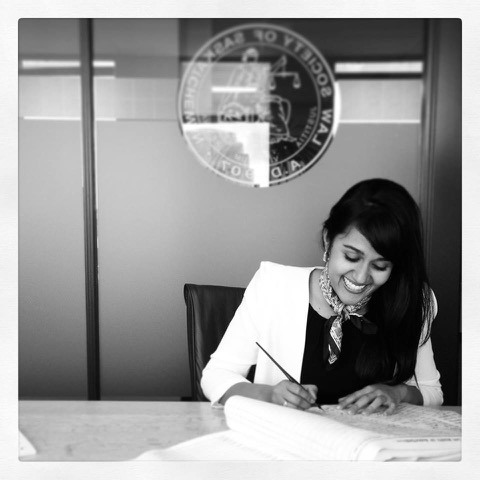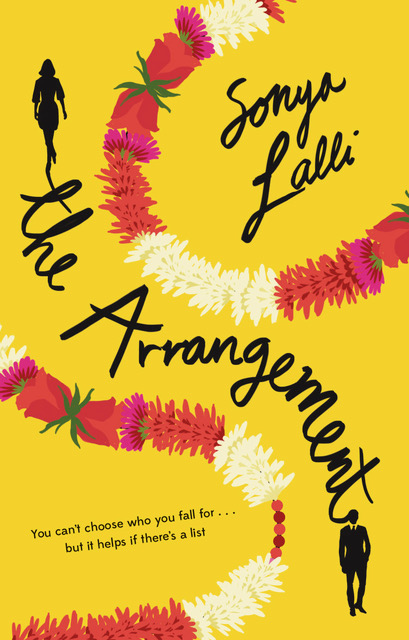Author Sonya Lalli shares her tips for writing real-life romantic comedy.

In a way, romantic comedies can be quite predictable. Usually, your heroine ends up with the hero – even if the hero isn't who readers first thought it would be. So what makes a story in that genre memorable is everything that happens in between: the characters’ personalities and back stories, how the author has set up the will they/won’t they tension, and the internal and external conflicts that are trying to keep your lovebirds apart. Here are some tips for writing romantic comedy I have picked up while writing The Arrangement!
A perfect heroine has imperfections
Generally, readers want their leading lady in women’s fiction to be relatable and likeable; she doesn't have to be of course, but this tends to be the case. After all, when she’s likeable it’s easier for readers to empathize with her and become invested in her journey.
But this doesn't mean your heroine has to be amenable and nice all the time. If she is, chances are she’ll fade into the background of the narrative, and your secondary characters – whose flaws are perhaps what increase the book’s dramatic tension – will outshine her.
To some degree, allow your heroine to have sides to her that are sassy, impulsive, bratty, clingy, snappy, misguided, etc.. It will make her more interesting and stand out on the page, and if you do it right, it can help draw more empathy from your readers; I mean, who among us is actually perfect? Finally, a flawed heroine has the opportunity to grow and become a more fully developed character. The more developed she is, the memorable she – and you – are to readers.

Characters should speak how we speak to each other
If your best friend tells you that she hates your new boyfriend, would you simply nod your head and say “Many thanks for the observation, darling.”?
Unless you’re masking hurt feelings, probably not. More likely than not, this kind of confrontation would lead to an argument. You might get defensive and tell your friend to back off, or perhaps you already know the guy you’re dating is bad news and were waiting for someone to say it out loud.
Whatever the scenario, scene or conflict, allow your characters to speak their mind, and actually say things real people say to each other in those types of circumstances. Your characters and story will be more believable, all the while helping create tension in your narrative.
Finding love doesn’t have to be your heroine’s (only) happy ending
The will they/won’t they end up together tension is often the main thrust of romantic comedies, but sometimes narratives can become stagnant if your heroine doesn't have anything else at stake. In The Arrangement, Raina’s love story is the main plot line, but she’s also battling family expectations and facing other struggles in her personal life and career. All of this – I hope – added to the primary storyline of which guy she ends up with.
Try giving your leading lady every opportunity to grow. A fully developed character is inherently a more interesting one, which make readers care so much more what happens to her and who she ends up with. Maybe she also needs to heal a relationship with a family member or friend, or is deciding whether to go back to uni and change careers. Whatever it is, make her sweat and suffer setbacks. Really make her work for it. The pay off will also show up in your love story.
Escapism vs realism
I find that within the romantic comedy genre, we see both escapist and realistic storylines. Books that are essentially escapism give readers the chance to shed their real world worries. These books are heartfelt, lovely and very important, and if this is what you’re writing just ignore the next few paragraphs!
For those of us writing realistic romantic comedy, I believe that we need to bring the real world into our narratives – the good, the bad and the ugly.
I'm not saying write a social or political commentary. I'm saying allow your characters to be informed about and affected by real life issues facing us today. It adds another layer to your story, ramps up conflict (picture your heroine’s racist relative at Christmas dinner), and can give your characters purpose or meaning.
Me Before You is without a doubt the biggest romantic comedy we have seen in recent years. It scores tens across the board in terms of style, characters, plotline – you name it. But it also pushes boundaries, requiring readers to really think about issues surrounding class and disability.
What issues might your character come face to face with? How might this be woven into the plot, and how might she react, change and grow? For me, romantic comedy is about laughing, falling in love and getting your heartbroken in an imperfect world. Draw from that world as much as you can!
Sonya Lalli is a journalist, lawyer and author of THE ARRANGEMENT. Connect with her on Twitter or visit her website here.
Comments